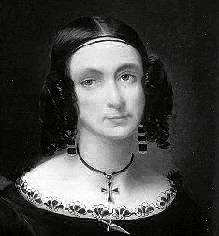Louise Bertin facts for kids
Louise-Angélique Bertin (born January 15, 1805 – died April 26, 1877) was a talented French composer and poet. She wrote many musical pieces, including operas, and also published books of poetry.
Contents
Early Life and Musical Beginnings
Louise Bertin was born in Les Roches, a town in France. Her father, Louis-François Bertin, was the editor of a very important newspaper called Journal des débats. Later, her brother also worked there. Her family encouraged her to study music.
Louise took music lessons from François-Joseph Fétis, a well-known teacher. In 1825, when she was 20, her first opera, Guy Mannering, was performed privately for her family. This opera was based on a book by Walter Scott.
Two years later, in 1827, her second opera, Le Loup-garou (which means 'The Werewolf'), was performed for the public at the Opéra-Comique in Paris.
Composing Operas
When Louise was 21, she started working on a new opera called Fausto. She wrote the story (called a libretto) herself in Italian. The opera was based on the famous German story Faust by Johann Wolfgang von Goethe. Her father likely suggested this idea to her.
Fausto was supposed to be performed in 1830, but there were many delays. It finally opened in 1831. However, it was not very popular and only had three performances.
Around this time, Louise Bertin became friends with the famous writer Victor Hugo. Hugo had an idea for an opera based on his book Notre-Dame de Paris (which you might know as The Hunchback of Notre Dame). Together, they created the opera La Esmeralda. Victor Hugo wrote the words for the songs. Louise Bertin was the only composer who worked directly with Hugo on an opera.
Challenges and Later Music
When La Esmeralda began its performances in 1836, some people made accusations against Louise and her family. They claimed she received special treatment because her brother had connections to the opera management. During the seventh performance, a disturbance broke out, and La Esmeralda's performances had to stop.
The composer Hector Berlioz, who helped Louise with the opera, was also wrongly accused of writing the best parts of the music. He strongly denied this. Feeling frustrated by these problems, Louise Bertin decided not to write any more operas.
Even though she stopped writing operas, Louise continued to compose other types of music. She wrote twelve cantatas (pieces for singers and instruments), six piano ballades (story-like piano pieces), and five chamber symphonies (smaller symphonies). She also wrote some string quartets (for four string instruments) and a piano trio (for piano, violin, and cello). This trio included musical ideas from her operas Fausto and La Esmeralda. Of all these later works, only her ballades and the piano trio were published.
Poetry and Legacy
Louise Bertin was also a talented poet. She published two books of poetry: Les Glanes in 1842 and Nouvelles Glanes in 1876. Her first book, Les Glanes, even won a prize from the Académie française, a very important French organization for arts and literature.
Louise Bertin passed away in Paris in 1877, the year after her second poetry book was published.
Recordings
- La Esmeralda, with Maya Boog (soprano); Manuel Núñez Camelino (tenor) as Phoebus; Francesco Ellero d’Artegna (bass) as Claude Frollo; and Frédéric Antoun (tenor) as Quasimodo; Orchestre national de Montpellier, conducted by Lawrence Foster; Festival de Radio France et Montpellier; label: Accord.
See also
 In Spanish: Louise Bertin para niños
In Spanish: Louise Bertin para niños
 | John T. Biggers |
 | Thomas Blackshear |
 | Mark Bradford |
 | Beverly Buchanan |


